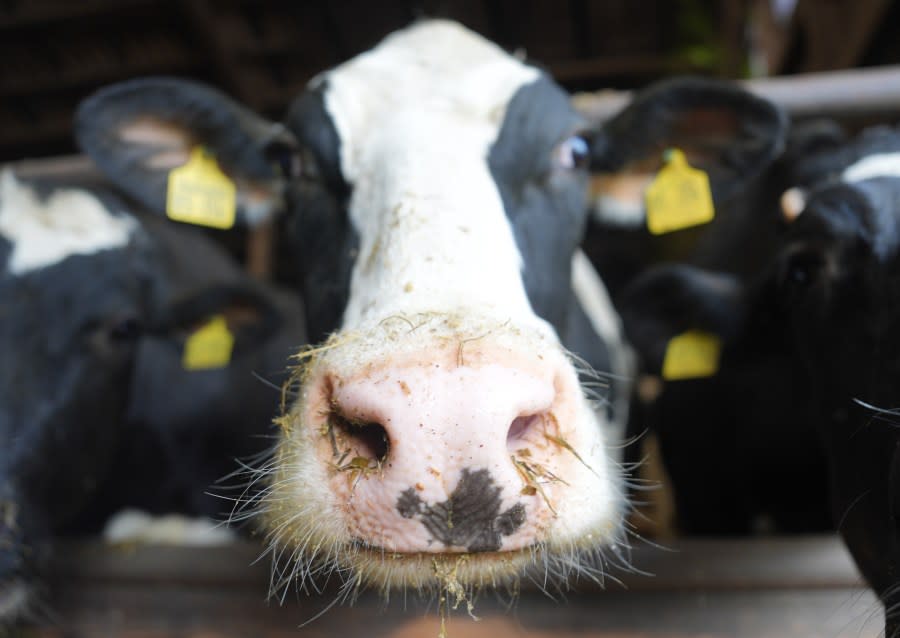Bird flu virus confirmed in Idaho dairy herd; Human case linked to outbreak in Texas

SALT LAKE CITY (ABC4) — The outbreak of highly pathogenic bird flu among the nation’s dairy cows is creeping closer to Utah as a herd in southern Idaho was confirmed last week to have the virus.
The Idaho State Department of Agriculture said the affected farm in Cassia County had imported cattle from another state previously identified as having the virus, suggesting that the strain could be transmitted “cow-to-cow.”
PREVIOUS STORY: Illness affecting dairy cows prompts Utah to tighten livestock import requirements
Previously, the U.S. Department of Agriculture (USDA) suspected that infected herds in other states, such as Texas and Kansas, were exposed to the virus from dead migratory birds that contaminated the farms.
The identification of the virus in Idaho marks the second state bordering Utah known to have the virus, which causes dairy cows to suddenly be less productive and produce thick, syrupy milk. The other Utah border state with herds that presumptively tested positive was New Mexico.
In response to the highly pathogenic bird flu outbreak, which is the first recorded among the nation’s dairy cows, the Utah Department of Agriculture tightened requirements on importing cattle.
The requirements were initially set to last 30 days, and applied only to lactating dairy cows from affected states, which now include Texas, Kansas, New Mexico, Idaho, and Michigan.

So far, no cases of infected dairy cows have been reported in Utah. However, state officials told ABC4.com that highly pathogenic avian flu will be difficult to keep out of Utah if it’s spread by migrating birds, not to mention from cow-to-cow.
According to officials in Texas, the highly pathogenic bird flu virus identified in herds last month is the Type A H5N1 strain, which is known for causing deadly outbreaks in birds and occasional transmissions to humans.
On Monday, the Texas Department of State Health Services reported a human case of H5N1.
This was the second-ever case of the illness reported in people in the United States, and it’s the first linked to the dairy cow outbreak. Officials said the infected person had direct exposure to one of the infected herds. The patient’s only symptom was eye inflammation.
Federal and state officials maintain that the risk to the general public remains low, noting that it’s highly unlikely that H5N1 can pass from person to person. The Centers for Disease Control and Prevention and other state and federal agencies are monitoring the virus to see if it becomes more transmissible to people.
Federal officials also maintain there is currently no risk to the commercial milk supply, as the mandated pasteurization process inactivates bacteria and viruses, including influenza. Even so, the Food and Drug Administration is reminding raw milk consumers that the product can harbor dangerous microorganisms.
READ NEXT: Utah has 4 of the top 5 snowiest ski resorts in U.S. this season: Report
Although the virus is leading to milk production losses, the scale of the issue isn’t large enough to affect consumer prices.
“Milk loss resulting from symptomatic cattle to date is too limited to have a major impact on supply and there should be no impact on the price of milk or other dairy products,” the USDA said Friday in a summary report. “Further, the U.S. typically has a more than sufficient milk supply in the spring months due to seasonally higher production.”
Aside from reduced milk production, other symptoms of the virus in dairy cows include lethargy, loss of appetite and slight fever. According to the USDA, most cows that get the virus recover after isolation with “little to no associated mortality.”
Any farmers in Utah (or across the country) who see symptoms in dairy cows are urged to call a veterinarian and report the symptoms to state officials so that the virus can continue to be monitored.
For the latest news, weather, sports, and streaming video, head to ABC4 Utah.

